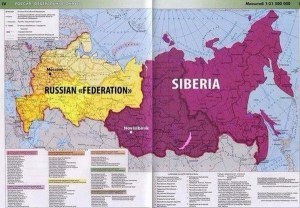Bill Murray's Blog, page 125
August 14, 2014
Finlandization
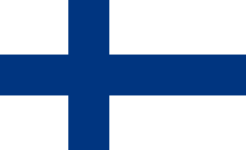
While we’re on the subject of Finland, the travel writer Jeffrey Tayler proposes Finlandization as his solution to the Ukraine situation. If you’re interested, here is his article and here is a very short history of Finlandization. After you read those, come back and continue below the jump for my own comments.
As a huge fan of Jeffrey Tayler’s adventure travel books I’m always eager to read his views, and I’m happy to agree that the Corker bill sounds bellicose, would be unpalatable to the Russian leadership and would never work. I do have a couple of quibbles with the article, though.
Mr. Tayler proposes that “the United States should commit to not inviting Ukraine to join NATO, and thereby preserving for the country a status of neutrality identical to that enjoyed by Finland.”
Not inviting Ukraine to join NATO would hardly create a status identical to Finland. Finland is a much more homogenous country with a far smaller percentage of ethnic Russians than Ukraine. Russian is the mother tongue of about 1.3% of people in Finland while over 17% of people in Ukraine identify as ethnic Russian. The likelihood of continuing agitation by ethnic Russian separatists is far greater in Ukraine.
Second, Mr. Tayler writes, “Ukraine would, in effect, to the benefit of all parties, be ‘Finlandized’ — that is, neutral. There is nothing negative in the term. Finland shares a long land border with Russia, of which it once was a part, and with which it now enjoys normal relations.”
I don’t know of any issue on which the views of Russia don’t have huge bearing on Finland’s politics, so relations, while normally good, aren’t quite ‘normal.’ When Russia sneezes Finland catches cold.
While there may be nothing negative in the term Finlandization, James Kirchick’s article (link above) shows some of the many ways Finlandization, as a policy, warped Finnish development during the Soviet years. Just sayin’.


Finland in Twelve Photos
About this time most years, we’re busy at the lake with a rowboat and a sauna at our cabin in Finland. We’re not there this summer and I miss it! So let’s take a photo tour. Click ‘em to make ‘em bigger:
Here’s our little cabin.
 Just down the path, the sauna and rowboat.
Just down the path, the sauna and rowboat.
The sauna from the lake. It’s kind of hidden.
 Our duck family changes every year.
Our duck family changes every year.
And in the summer, after a rain when the light’s just right, rainbows!
The winter puts on its own show. Here, way up north in Saariselkä, in Lapland, is the revoltulet (literally, “fox fire”), the northern lights.
Read on for more photos from Finland, and there are over 200 more in the Finland Gallery at EarthPhotos.com.
The Helsinki waterfront.
Downtown.
A Finnish icon. These guys guard the main Helsinki train station.
This is in the port city of Turku, up the west coast.
And finally, horses!


August 13, 2014
The Difference Between the ISIS and Ukraine Stories
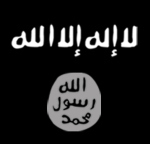 TV viewers react with well-founded, visceral fear to the ISIS story, but at bottom ISIS is a band of thugs with an archaic worldview that a willful president and his or her allies, if they had a mind to, could clobber using Colin Powell’s overwhelming force commensurate with ISIS’s brutality. The challenge to Ukraine, on the other hand, is an assault on the world’s organizing principles, with the potential to collaterally undermine both NATO and the Obama administration.
TV viewers react with well-founded, visceral fear to the ISIS story, but at bottom ISIS is a band of thugs with an archaic worldview that a willful president and his or her allies, if they had a mind to, could clobber using Colin Powell’s overwhelming force commensurate with ISIS’s brutality. The challenge to Ukraine, on the other hand, is an assault on the world’s organizing principles, with the potential to collaterally undermine both NATO and the Obama administration.
The creeping annexation of first Crimea and now the Donbass is more subtle and harder to follow than the plight of people stuck on a mountain, yet it has more potential to undermine international systems. Dire warnings by the professional national-security-for-profit apparatus that JIHADIS ARE COMING TO YOUR NEIGHBORHOOD are far more sensational than real, but they make great TV. By comparison, an academic discussion about Ukraine and competing power blocks in the post Cold War world only prompts a rush for the remote.
Many of the institutions set up at the end of World War Two need a sharp, thorough overhaul. But they remain in place because they have provided more stability than chaos and no challenge has emerged that promises more liberté, egalité and fraternité.
In 1990, with Kuwait occupied by Iraq, George Bush proclaimed a New World Order but over time Americans grew reluctant to propose new institutions to deal with new realities. It turned out they rather liked their hyperpuissance. Since the Clinton years the new order has remained largely inchoate (though not for lack of predictions). Should Russia now redraw the map of Ukraine on its own, some of the mist will begin to clear and few west of Moscow will like what they see.
Ukraine right now is hugely important because Russia is challenging the fundamental ways the world has organized itself for seventy years and the whole world is watching. The potential impact of the ISIS insurgency is much smaller. It is a manifestation of the post-Ottoman Sykes-Picot agreement, an element of the reshaping of the Middle East region and not the entire world.
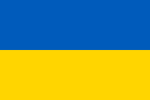
So what about Ukraine? Today the pertinent news sites and #Ukraine, #Donbass, #convoy, #Crimea and so on on Twitter read like play-by-play.
We knew nothing good would come of this convoy thing, didn’t we? Just like in Crimea when the war was over while we still celebrated the #Euromaidan, it’s all happening today, Wednesday, in eastern Ukraine.
MT @MiddleEast_BRK Sh*t starts happening w/"white truck humanit aid convoy"- Single trucks leave bulk, drive towards #Rostov oblast #Ukraine—
hp (@2111015) August 13, 2014
@MiddleEast_BRK there will be a fake "humanitarian convoy" from Rostov which will enter Sukhodolsk obozrevatel.com/politics/74930… @JSaryuszWolski—
Андрій (@AndrijUKR) August 13, 2014
Rostov is south of any crossing point proposed so far. If you’re intent on creating chaos, just peel away and melt into … who knows where. And while shamelessly hoisting the forged banner of the International Committee of the Red Cross.
Chairman of Kharkiv Regional State Admin has indicated that the Russian aid convoy will not cross the border in the Kharkiv region. #Ukraine—
Dan Hodgson (@darkroom) August 13, 2014
280 military trucks carrying ‘aid’ under hastily assembled white canvas, juking, their recipient not knowing their route or their intent – least of all the ICRC dude standing outside their building in Geneva dispensing press statements.
Meanwhile, as I mentioned last night:
#Putin, #Russia Security Council meet in #Crimea 13/14Aug. Watch out! Is #convoy diversion away from action elsewhere? #Ukraine #NATO #ICRC—
Bill Murray (@BMurrayWriter) August 12, 2014
This morning, well:
Russian white snake convoy at Izvarine: Yes/No. In/Out? This is deliberate tactic of distraction while Russia slips REAL forces cross border—
GorseFires Collectif (@GorseFires) August 13, 2014
It’s all just so unseemly. Russia lurks on the gangstas side of town. Always has. In the Cold War, cynical authoritarianism under equality’s cloak. Now it’s the same authoritarianism under the cloak of, well, nothing.


August 7, 2014
Time to Lighten Up a Little
It’s important to talk about wars and rumors of wars, but CS&W was originally about travel, travel writing and photography. So today, back to that.
Wherever we go we collect photos of fun, strange, unusual, bewildering, sometimes incomprehensible signs. Here are a few for your amusement, and there are over 450 in the Signs Gallery at EarthPhotos.com. Go ahead, have some fun.
Click ‘em to make them bigger.
The venerable Miss Puke, Siam Square, Bangkok. She’s been there for years. Last confirmed last Christmas.
Of course not. Seen in Hanoi.
Whatever it says, it means it. Illimanaq, Greenland.
Ad man at work, downtown Rangoon, Burma.
Something lost in translation. At a shopping center on Hainan Island, China.
Making a living in Fort Portal, Uganda.
Might want to click through on this one to make it bigger so you can read it. This restaurant in Lima, Peru offers real, fresh aborigines!
Click on through for a dozen more.
This is the facade over a theatre entrance in Vilnius, Lithuania.
Sign on the back of the driver’s seat in a cab in Hong Kong.
Graffiti, Sarajevo not long after the war.
Who said you did? At a Moscow flea market in the snow.
Your guess is as good as mine. Over a door in Sydney, Australia.
All the important places. Thai restaurant in Helsinki.
This guy’s got it all. A shop just outside Lilongwe, Malawi.
Self-service ferry stop near Port Vila, Vanuatu.
We never got down there, so I don’t know. St. Helena Island, South Atlantic Ocean.
I ain’t going in there. Yerevan, Armenia.
Might need to click this one to read it. A plea for modesty in a cabin on the MV Ilala, sailing across Lake Malawi.
Sign in a restaurant in Gangtok, Sikkim, India.


August 6, 2014
Web Resources for War News
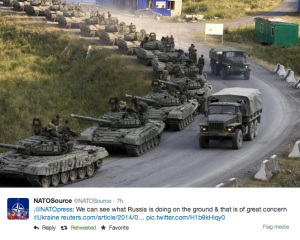
Me, I got this uneasy feeling. It may be that them what know ain’t saying and them saying don’t know, but the Polish PM and NATO are queasy, and when the Russian UN ambassador calls for “humanitarian intervention” and the Putin team uses RT to wail it, it looks like boxes are being checked for an invasion. The U.S. Defense Secretary is in the region, saying as much. It’s a good thing everybody’s got so much confidence in our president.
I’d guess it would start overnight one night, and since we’re seven hours earlier here on the U.S. east coast we might find ourselves up all night one night soon working the internets and the news channels. Just in case, here are a few internet resources and live TV feeds from the region:
The Interpreter translates news from Russia
Espreso.tv from Kyiv has a live feed
TV5, Kyiv live feed
UkrainianJournal.com, in English
The Kyiv Post
The Carnegie Moscow Center and especially Demitri Trenin and Lilia Shevtsova (click “latest analysis”)
Tons of links from Johnson’s Russia List
Life News live from Russia
Russia24 live feed
Ukraine News1 in English
The Warsaw Voice in English
thenews.pl, news in English from Poland
Radio Free Europe Radio Liberty, which runs a live Ukraine blog during the day, CET
NATO’s blog
Please suggest more.


August 5, 2014
Future Long Haul Travel Woes?
From today’s Moscow Times:
Russia May Ban EU Airlines’ Routes Over Siberia in Response to Sanctions
“… a ban could cost carriers including Lufthansa, British Airways and Air France 1 billion euros ($1.3 billion) over three months. Restrictions would lead to longer flights, higher fuel use and other additional costs.”
And higher prices for passengers.


August 2, 2014
Plausible Map of New New Russia
This map was proposed by a group in Novosibirsk (along with a “march for federalization of Siberia” planned for August 17th there) in an article in Slon which has since been censored and taken down. Russia seized the Crimea to impose “self-determination” and fights for “Novorossiya” in the Donbass. Just don’t try the self-determination thing at home.


August 1, 2014
Lunch, Japan Air Lines
July 24, 2014
Prague, Czech Republic
July 22, 2014
Big, Important Writers Embarrassing Themselves
Robert W. Merry is Political Editor at the ‘realist’ web site The National Interest. He has written an article, The Ghosts of World War I Circle over Ukraine, posted to the site today. Here is a screen grab of the first paragraph:
Any introductory college geography course would have explained to Mr. Merry that “accretion” as defined by Merriam Webster, is “a gradual process in which layers of a material are formed as small amounts are added over time: something that has grown or accumulated slowly: a product or result of gradual growth.”
In the interest of using a big, fancy-sounding word, Mr. Merry has written exactly the opposite of what he meant. One good thing about the internet though, you can fix it before too many people notice. The pertinent line now reads “World outrage has focused on Russian president Vladimir Putin to such an extent that Putin has suffered a huge loss of moral authority.”
Pompous: “Accretion.” Better: “Loss.”
Then there’s Robert D. Kaplan.
Balkan Ghosts: A Journey through History by Robert D Kaplan was essential reading during the Balkan Wars of the 1990s for Americans like me (and then-President Clinton) to whom the region was foreign, distant and exotic (It opened up a world of further great books, like Rebecca West’s Black Lamb and Gray Falcon and The Bridge on the Drina by Ivo Andric, all of which would be timely and absorbing reads in this centennial summer of the outbreak of the Great War – in the Balkans).
Mr. Kaplan has his critics (1, 2, 3, 4 et al, but especially Tom Bissell), but he has been prolific and influential ever since Balkan Ghosts, traveling widely – and often to frightening places – and publishing more than a dozen books.
Too bad though, maybe that ‘The President Read My Book’ thing got too far into Mr. Kaplan’s head. Take a look at a column from July 10th by RDK headlined Why Moldova Urgently Matters. It begins this way “NATO’s Article 5 offers little protection against Vladimir Putin’s Russia, Iulian Fota, Romania’s presidential national security adviser, told me on a recent visit to Bucharest.” Right. Got it. Nowadays RDK meets with the Romanian Foreign Minister.
Next RDK quotes the Foreign Minister and then tells us what the Foreign Minister meant. In case the Foreign Minister isn’t capable of making his meaning clear, RDK will: “‘Article 5 protects Romania and other Eastern European countries against a military invasion. But it does not protect them against subversion,’ that is, intelligence activities, the running of criminal networks, the buying-up of banks and other strategic assets, and indirect control of media organs to undermine public opinion.”
A couple sentences down the road he mentions, “As Romanian President Traian Basescu told me….” Got it. RDK met the President, too.
Shortly we learn that RDK met the county council president in Iasi, Moldova and that “Alone with me in the empty theater, Adomnitei (the council president) declared, “Here is Europe, here is its history and culture, its artistic values, and maybe soon its political values. Here is the borderland of the Habsburg Empire. We need your help to defend us.” These days, politicians plead with RDK for help.
It doesn’t take long for this: “Moldova’s very identity is still somewhat an issue, the prime minister, Iurie Leanca, admitted to me in a long interview.” Natch. The Moldovan PM confides in RDK too. He admits things. In long interviews.
“I cannot help but recall the dark political landscape in Yugoslavia while reporting there in the 1980s in advance of the violent break up of that country in the 1990s.” RDK reminds us of his war cred.
“My writing apparently helped influence a White House policy of inaction from 1993 to 1995.” RDK is good at reminding us about stuff.
We come to the end and good, thoughtful stuff: “For weeks I traveled around Moldova. Indeed, the common theme everywhere was that Russia is a reality while the West is only a geopolitical concept.” THIS is worth knowing.
Let us stipulate that you are a very important and wise man, RDK. Then you only need write the good stuff.































